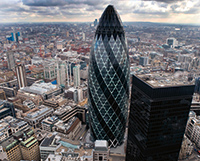FINANCE: The long-expected receivership of iconic City building the Gherkin became a reality this afternoon.
Phil Bowers and Neville Khan of Deloitte were appointed joint fixed-charge receivers of the 516,000 sq ft office 30 St Mary Axe eight years after it was bought by IVG and Evans Randall.
The £630m purchase in 2006 of what was at the time the newest addition to London’s burgeoning skyline was a high-profile deal from the beginning, with its subsequent debt difficulties closely watched by the market.
So where did all go wrong? A combination of the downturn and the complex structure of the loan including crucial currency denomination issues all contributed to the ultimate loss of control of the building.
German fund manager IVG bought its 50% the building from insurance firm Swiss Re, which developed and occupies half of the property on behalf of its EuroSelect 14 fund. The vehicle is invested in by 9,000 retail investors.
They were joined by private investment bank Evans Randall, which invests on behalf of its private client network.
The partners put in £234m of equity and secured a £396m loan from a consortium of five banks led by Bayerische Landesbank, reflecting a relatively modest loan-to-value of 63%.
As the Swiss insurer’s rent on the 41-storey building was paid in Swiss francs, 45% of the loan, which does not mature until 2022, was denominated in that currency.
With separate loans secured against each of the partner’s stakes, it was IVG’s tranche that was denominated in the Swiss currency.
Breaching covenants
As the global financial crisis took hold and property values plummeted, the building’s LTV crept up and covenants were breached.
Currency movements have also inflated the debt pile as IVG’s tranche in francs was not hedged, so as the franc has risen in value against sterling the debt has increased.
The latest annual valuation report puts the total debt secured against the building at £509m and the building’s value at £530m, putting the LTV at 96% against a 67% covenant on the loan.
With new equity desperately needed pay down debt and bring down the LTV ratio, the partners appointed CBRE in March 2013 to advise on a debt restructuring. A figure of £75m of equity was mooted with the onus on IVG to find the bulk of the new money as its loan had suffered the most.
This meant negotiation with its 9,000 investors in Euroselect 14, which had not seen a dividend since 2009 because the income from the building was being used as collateral by the banks.
Unsurprisingly, no agreement was reached with the investors confronted with the grim choice of investing more money into the fund or seeing their investment diluted by new equity.
At the same time the German giant, which had overgeared and overreached, was fighting fires on other fronts and eventually filed for self-administration in August last year.
Its €3.4bn (£2.9bn) private funds business, which included Euroselect 14, was sold to German rival Deutsche Immobilien holdings, the real estate arm of Zech Group, last month.
The role the new owner played in today’s receivership is unclear and no hint was given by a statement from Deloitte’s Kahn, which expressed the senior lenders’ “reluctance” at the appointment.
“No choice”
It explained that the lenders felt “they had no choice, due to the ongoing defaults, which have remained uncured for more than five years, and concerns that the borrowers’ lack of equity in the transaction had caused their incentives to become misaligned with the lenders”.
Sources have poured cold water on the idea of the borrowers attempting to buy the building out of receivership, but Evans Randall meanwhile is unequivocal about its position.
A spokesman for the firm said it was “firmly minded” to continue its involvement in the “strong, well-let asset”.
Evans Randall’s statement said: “As widely reported previously, the default has arisen largely as a consequence of the IVG tranche of the loan being denominated in Swiss francs and has been exacerbated by the insolvency at IVG.
“These factors have so far impeded Evans Randall’s ability to restructure the financing on the asset, including the injection of new equity.
“Evans Randall has equity ready to invest and has been unable to do so because of the inability to agree a consensual solution with IVG, given these uncertainties.”
So what happens now? One source close to the situation said there was no chance of this being a quick sale.
Although Deloitte is soon expected to be approaching agents to pitch for a sales mandate, unpicking the complexities of a receivership that is eight years in the making will take time.
This won’t abate immediate interest from cash-rich sovereign wealth funds from countries such as Korea, Canada China and the US, that are shopping for iconic London buildings
Despite an open market sales process not likely until 2015, improving values and major regear with tenant Kirkland Ellis means that a price tag of £600m is already doing the rounds – not far off its 2006 sale price.
bridget.oconnell@estatesgazette.com











